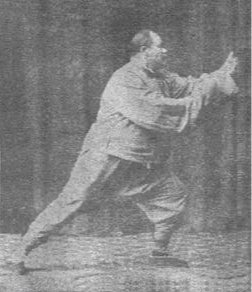
The way of the warrior
In this podcast there was a reminder of the wonderful 1983 BBC series - The Way of the Warrior - which has been uploaded to YouTube.
I watched this series with my father, but can’t say I remember the individual programmes. He bought the book that accompanied the series and I am currently looking for a copy.
The quality of the video compared to modern standards is shocking! Nevertheless, there is so much there worth learning, you just have to push through.

Piguaquan
Piguaquan (Chinese: 劈挂拳; lit. 'chop-hanging fist'), also known as Piguazhang (Chinese: 劈挂掌; lit. 'chop-hanging palm') due to its emphasis on palm techniques, is often practiced along with Bajiquan (Chinese: 八极拳; lit. 'eight extremes fist') and is a style of wushu (Chinese martial arts) that features explosive, long-range power.

Wrath of the Dragon: The Real Fights of Bruce Lee
Wasn't sure it was going to be my sort of thing, but enjoyed it a lot.
In his early fights Bruce often used 'vertical punches' and 'chain punches' to great success. Ben our Kung Fu sifu has done quite a bit of training with us on the latter.

Peng, Lu, Ji, An
Literally - ward off, rollback, press and push.
From Tai Chi Forms in the section called grasp the bird’s tail or grasp the sparrow’s tail.

The Art of the Straight Line
I had no idea that Lou Reed, the singer from the Velvet Underground, was for many years a Chen practitioner.

Early Morning Outdoor Tai Chi Vitality Booster
I will be running classes in my garden in Ash Green, near Aldershot, every weekday morning in from Monday 05 June to Friday 25 August at 07:00-08:00. The idea is to give you an energy boost to start your day. To be honest, it’s also a technique for getting me up and doing my own exercise!

Yang Long Form
After learning the ‘Short’ form (after Cheng Man-ch'ing), in both right and left directions, Wutan students may progress to the ‘Long Yang’ form. Perhaps you will see it called the ‘Yang traditional form’, or the ‘Old Yang form’. We describe it as having 108 postures and this matches content you will find on-line.

The Taiji Classics
I am a keen podcast listener, and one that I look forward to is The Tai Chi Notebook by martial artist Graham Barlow. His interests cover Tai Chi, Xing Yi, Brazilian Jiu Jitsu and the study of the martial arts. He often interviews fellow practitioners, but on his most recent podcast he was alone and talking about the ‘Tai Chi Classics’. I played this over and over on repeat, and I am sure I will do so again. Listen below or find the podcast in your favourite podcast player.

Is Tai Chi Good For You?
Difficult to say, but speaking as a slightly overweight man in his late fifties (1.9 m, 98 kg), I enjoy it! And isn’t that half the battle with exercise?

Short Form - deeper
There are five main family styles of Tai Chi, and Wutan schools start by teaching the Yang family style (link).
Specifically, the head of our school, Master They Soon Tuan, recommends we initially teach what is colloquially called ‘Short Form’.
The Short Form comes in many variations. The one we teach consists of thirty seven ‘postures’, and is much abbreviated from Yang’s original ‘long form’, but can still take anywhere from six to ten minutes to complete when focusing carefully on technique and breathing.
Wutan’s ‘Yang’ short form is actually derived from a form created by Cheng Man-ch’ing (Zheng Manqing and sometimes referred to as ‘CMC’) (link), who studied with Yang Chengfu for a number of years.

What is push hands?
Pushing hands is said to be the gateway for students to experientially understand the martial aspects of the internal martial arts (內家 nèijiā): leverage, reflex, sensitivity, timing, coordination and positioning. Pushing hands works to undo a person's natural instinct to resist force with force, teaching the body to yield to force and redirect it. Some t'ai chi schools teach push hands to complement the physical conditioning of performing solo routines. Push hands allows students to learn how to respond to external stimuli using techniques from their forms practice. Among other things, training with a partner allows a student to develop ting jing (listening power), the sensitivity to feel the direction and strength of a partner's intention. In that sense pushing hands is a contract between students to train in the defensive and offensive movement principles of their martial art: learning to generate, coordinate and deliver power to another and also how to effectively neutralize incoming forces in a safe environment.

Xing Yi - Five Element Fists
Xing Yi Quan is classified as one of the internal styles of Chinese martial arts. The name of the art translates approximately to "Form-Intention Fist", or "Shape-Will Fist".

Short Form - An Aide Memoir
Tai Chi ‘Short Form’ after Cheng Man-ch'ing (or Zheng Manqing).
Always forgetting the sequence of moves? We hope this helps.
Each ‘section’ finishes / starts with Single Whip.

Eight Pieces of Brocade
Baduanjin qigong
Continuing on from our light hearted look at ways to remember the sequence of this form of Qigong here, watch these contrasting videos and read this short article on Wikipedia.

Struggling To Remember Eight Pieces Of Brocade Qigong?
🥷🏻 Eight pieces of brocade as emoji…